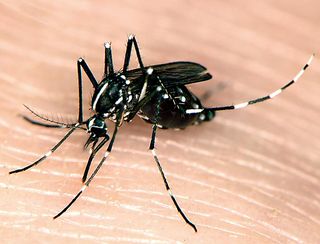from the SGV Mosquito & Vector Conrol District
Experts at the San Gabriel Valley Mosquito & Vector Control District are reporting an uptick in invasive Asian tiger mosquito activity last week.
This mosquito was first identified in the San Gabriel Valley last September. In early May of this year, additional mosquitoes were collected indicating that they had survived the winter. Between May 10 and June 8, the mosquito had only been found at 5 sites in El Monte and 7 in South El Monte. Last week; 7 new sites were identified in El Monte, 6 of those on Friday, June 15, alone.
The current infestation is within an approximate three-mile area bounded generally by Merced Avenue to the west, Valley Blvd/San Bernardino Fwy. to the north, and Durfee Ave. to the southeast.
The District has had a team of 8 full-time vector control technicians working daily in the area since April, and employed the services of an additional 6 California Conservation Corps members through the month of May to assist with our door-to-door inspections and education efforts. “We are very concerned that even with our considerable efforts in this area, the mosquitoes continue to proliferate,” said manager Kenn Fujioka, “It only takes one container of water in someone’s backyard to breed hundreds of mosquitoes.”
This mosquito thrives in warm weather and can complete its life-cycle in as few as 5 days during summer. The recent warm spells may have provided conditions favorable to the rapid development of mosquitoes from eggs laid in common outdoor containers. To break their life cycle, residents must remove all containers that are currently holding water or have held water in the past (where eggs may still reside). “We recommend residents check their yard for old plastic bins, buckets, tarps, trash, etc. and dispose of unneeded items. Other items like plant saucers, decorative pots, bird baths, and small fountains should be removed, inverted, or stored indoors,” says Fujioka.
Immature tiger mosquitoes (larvae & pupae) are often found in vases or buckets where plants are rooting. We urge residents to remove these or contact us so that we may apply a long-lasting treatment to the water.
Used tires provide ideal nursery conditions for mosquitoes. These should be removed from every yard. A FREE used tire recycling event will be held Saturday June 23rd from 9am – 3pm at the Whittier Narrows Recreation Area in South El Monte. For more information, please visit: http://ladpw.org/epd/tirerecycling/collection.cfm.
The District is currently inspecting and treating yards where the mosquitoes are found as well as properties surrounding these sites. Treatments include source reduction and the use of targeted pesticides for both larval and adult control.
The District cannot manage this problem alone. “The community must support us by allowing us access to inspect for mosquitoes as well as help by removing all sources of standing water. This is our small window of opportunity,” notes Fujioka, “If we are not successful now, all of us must forever accept the blame for letting this significant new menace and vector of several significant diseases establish itself in our communities.”
The Asian tiger mosquito is native to Southeast Asia and can be identified by its unique size, color, and feeding habits. The mosquito is approximately ¼ inch long and has distinctive black and white stripes across its body and legs. Unlike mosquitoes native to Southern California, the Asian tiger mosquito is an aggressive day-time biter and can transmit the viruses that cause dengue, chikungunya, and encephalitis.
In order to stop the spread of this species in Los Angeles County, public health officials are calling upon all residents in nearby communities to do their part by following these steps:
- CALL AND REPORT any sightings of small, black and white mosquitoes, or if you are being bitten by mosquitoes during the day!
- Dump and drain all standing water around your home.
- Discard or put away any containers, cans, buckets, and old tires around the home.
- Remove any water dishes from beneath potted plants and drill drain holes in all decorative flower pots, tire swings, and trash cans.
- Throw away trash in your yard including wrappers and bags.
- Do not store water in uncovered buckets or rain barrels. Ensure rain barrels are completely sealed to prevent mosquito entry.
- Empty bird baths and small fountains completely or clean them thoroughly every 3 days.
- Clean out rain gutters and lawn drains to ensure water does not collect.
- Water plants from the bottom near the soil, not the top.
- Asian tiger mosquitoes prefer wet, hot and humid areas with lots of plants, shrubs, and tree foliage. Regularly check gardens for potential breeding sites.
- Talk to your neighbors about preventing mosquitoes from breeding.
For more information about the Asian tiger mosquito, to submit a service request, or to report possible sightings, please contact the San Gabriel Valley Mosquito & Vector Control District at (626)814-9466 (www.sgvmosquito.org) or the Greater Los Angeles County Vector Control District at (562) 944-9656 (www.glacvcd.org).
The San Gabriel Valley Mosquito & Vector Control District is a public health agency dedicated to the control of mosquito and other vector-borne diseases.
The District can be reached at 626-814-9466 or on the web at www.sgvmosquito.org




